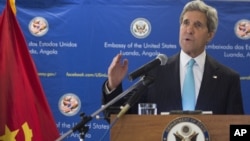LUANDA —
U.S. Secretary of State John Kerry is condemning South Sudan for violating a cease-fire agreement with rebels as he is pushing the leader of that rebellion to join peace talks in Ethiopia. Secretary Kerry met Monday in Angola with President Jose Eduardo dos Santos to discuss conflicts in the Central African Republic and the Democratic Republic of Congo.
Kerry says an offensive by government troops in South Sudan against rebel positions in the north violates the terms of a cease-fire meant to end four months of violence in the world's newest nation.
The most serious fighting began in late December, soon after President Salva Kiir's government accused former vice president Riek Machar of trying to seize power. Kerry said both men need to condemn attacks against civilians that he said show "disturbing leading indicators of the kind of ethnic, tribal, targeted, nationalistic killings" that "present a very serious challenge to the international community with respect to the question of genocide."
Kiir told Kerry that he will join peace talks in the Ethiopian capital. But Machar is resisting, telling reporters that he does not believe the conflict can be ended by establishing a transitional government before new elections.
Kerry said Machar has concerns about the logistics of peace talks, but "left the door open."
"He expressed some doubts, but he didn't say he wouldn't go. And I talked to [Ethiopian] Prime Minister Hailemariam who made it clear to me that Mr. Machar made a commitment to him that he would come," said Kerry.
Kerry said Machar has a fundamental decision to make about his future in South Sudan and his previous commitment to join peace talks.
"If he decides not to and procrastinates, then we have a number of different options that are available to us. We said we are serious. There will be accountability and implications if people do not join into this legitimate effort," said Kerry.
Kerry said those implications include sanctions, the imposition of an African intervention force, and international judicial action against those responsible for atrocities.
He spoke to reporters Monday in the Angolan capital following talks with dos Santos, during which he said he thanked the Angolan leader for backing peace efforts in the Central African Republic and in the Democratic Republic of Congo.
"Angola is playing a central role, integral role really, in bringing African nations together and in leading them towards an enduring peace, we hope, in the Great Lakes region," said Kerry.
He says the United States and Angola will work more closely on issues of energy, health and technology as well as increasing the number of Angolans in senior positions within the country's petroleum industry.
This is the last stop on a trip for the Secretary of State that has included talks with heads of state in Ethiopia, South Sudan, and the Democratic Republic of Congo.
Kerry says an offensive by government troops in South Sudan against rebel positions in the north violates the terms of a cease-fire meant to end four months of violence in the world's newest nation.
The most serious fighting began in late December, soon after President Salva Kiir's government accused former vice president Riek Machar of trying to seize power. Kerry said both men need to condemn attacks against civilians that he said show "disturbing leading indicators of the kind of ethnic, tribal, targeted, nationalistic killings" that "present a very serious challenge to the international community with respect to the question of genocide."
Kiir told Kerry that he will join peace talks in the Ethiopian capital. But Machar is resisting, telling reporters that he does not believe the conflict can be ended by establishing a transitional government before new elections.
Kerry said Machar has concerns about the logistics of peace talks, but "left the door open."
"He expressed some doubts, but he didn't say he wouldn't go. And I talked to [Ethiopian] Prime Minister Hailemariam who made it clear to me that Mr. Machar made a commitment to him that he would come," said Kerry.
Kerry said Machar has a fundamental decision to make about his future in South Sudan and his previous commitment to join peace talks.
"If he decides not to and procrastinates, then we have a number of different options that are available to us. We said we are serious. There will be accountability and implications if people do not join into this legitimate effort," said Kerry.
Kerry said those implications include sanctions, the imposition of an African intervention force, and international judicial action against those responsible for atrocities.
He spoke to reporters Monday in the Angolan capital following talks with dos Santos, during which he said he thanked the Angolan leader for backing peace efforts in the Central African Republic and in the Democratic Republic of Congo.
"Angola is playing a central role, integral role really, in bringing African nations together and in leading them towards an enduring peace, we hope, in the Great Lakes region," said Kerry.
He says the United States and Angola will work more closely on issues of energy, health and technology as well as increasing the number of Angolans in senior positions within the country's petroleum industry.
This is the last stop on a trip for the Secretary of State that has included talks with heads of state in Ethiopia, South Sudan, and the Democratic Republic of Congo.




